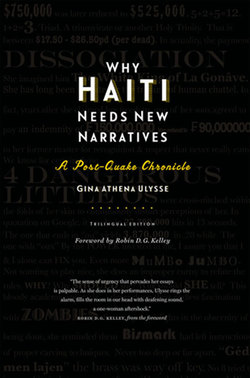Читать книгу Why Haiti Needs New Narratives - Gina Athena Ulysse - Страница 26
На сайте Литреса книга снята с продажи.
Оглавление14
Haiti’s Electionaval 2010
August 11, 2010 / Huffington Post @ 2:56 p.m.
With Wyclef Jean and Michel Martelly, aka Sweet Micky, (two well-known musicians) in the mix, Haiti’s upcoming election has taken a sardonic turn. The country is currently facing astronomical challenges since the devastating earthquake January 12 and is in desperate need of unprecedented leadership. At home and abroad, everyone is weighing in on the discussion.
A day after Jean’s announcement, Haitian-American journalist Marjorie Valbrun wrote an open letter to him titled “Dear Wyclef: Please Don’t Run” that is going viral.
I was in Port-au-Prince last week where the topic of discussion everywhere was presidential candidates. While I encountered folks who were quick to dismiss the artists as making a mockery of the process, and as a result refused to engage it seriously, others were deeply concerned about what this moment actually reveals about the current state of things in Haiti.
Indeed, the historical neglect of the masses by the elite has brought the country to this point where many people and especially the youth are so disenfranchised and fed up with the political machine that they will put their hope for change in an artist who promises miraculous deliverance.
Thus far, Wyclef has announced that he will use his star power to leverage the undelivered funds from the UN conference last March. As if the issue was only a matter of charisma and conviction. Never mind the last two hundred years of geopolitics. Jean also recently told NPR that Haiti needs a “global president,” and he is the guy. The last thing Haiti needs is an absentee president on a world tour.
On the contrary, if the country is to take a more democratic course, the president must be present, have substantive knowledge of the “local,” and also possess the foresight as well as the know-how necessary to navigate the republic’s long history of sociocultural and economic fragmentation with a structurally disorganized state that has continually exploited its nation. Creating a foundation with Haiti’s noted problems is not a matter of image; being generous and popular does not a president make.
Many of us wonder, who else is behind Jean’s candidacy? Besides using his fame and goodwill, what is the agenda of Viv Ansanm (Live Together), his party? How will he address and alleviate the persistent desperation that has plagued the nation? And in light of the recent report by MADRE, I am particularly curious to hear his take on issues pertaining to the vulnerability of women in the country.
Yesterday, Jean expanded upon some of his plans in an interview for Rolling Stone. Courting the diaspora, he is campaigning both in Haiti as well as on this side of the water. Part of Jean’s appeal to some voters is the fact that he is a foreigner in a sense and lacks experience. A young woman told me that people who are for Wyclef are tired of the seasoned politicians who keep promising change and don’t deliver. His financial success is another reason why many insist that he will be a leader of a different kind, less likely to engage in corruption.
Those who have spoken critically of Jean get a backlash from fanatics defending their candidate. Supporters point to his goodwill, public dedication, and obvious affection for his homeland.
With all the focus on Jean, less is being said of Martelly, who is as well known in Haiti and, equally if not more important, is accepted in some elite circles—an alliance usually necessary to ascend to the presidency. Moreover, Martelly is a less-questionable resident of Haiti who may not have to creatively circumvent Article 135 of the Constitution, which requires that presidential candidates reside in the country for five years.
Last Tuesday, the front page of Haiti’s Le Nouvelliste had a cartoon depicting the upcoming presidential elections, which they have appropriately dubbed “electionaval 2010” [meaning combined election and carnival]. President Préval stands to the left beneath a sign that reads “Welcome to the CEP” (Permanent Electoral Counsel), directing the upcoming procession. First in line is Jean on top of his truck, the Haitian flag by his side, with two members of his posse. Holding a mike, he boasts “we are the world” in English, then in Creole. The side of the truck is emblazoned with the orange-and-black Yele Haiti logo and the words “here’s Wyclef” in Creole. Immediately following him is the kompa king crooner Martelly in a sports car with his posse. His caption reads, “Those who don’t know Micky, here’s Micky.” Steps behind stands a peeved Jacques-Édouard Alexis, the former prime minister, asserting “I was here first,” in Creole, then, in French, “Leading a country is a serious matter.” Next to him is former first lady and candidate Madame Mirlande Manigat, who says, “I didn’t know that there would be a carnival.”
Madam, I must say, neither did we.
Meanwhile, there are other signs of civic engagement. Haiti Aid Watchdog is laboriously working with partners to organize a series of debates between civil society and the candidates. Their theme, “Nap vote pou yon pwogram! Pa pou yon moun!” (We’re voting for a program, not a person).
